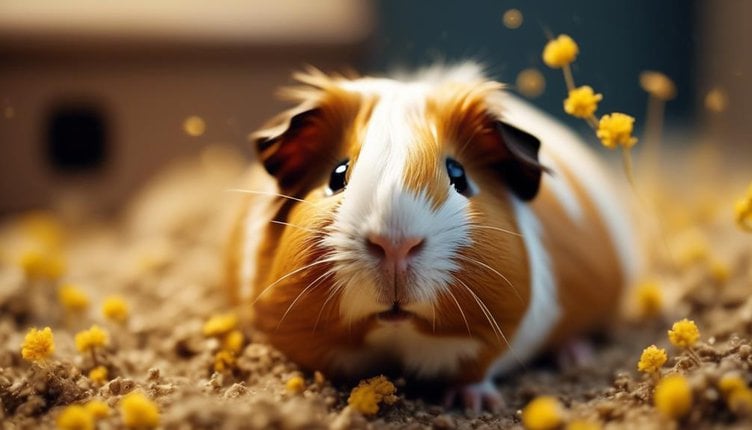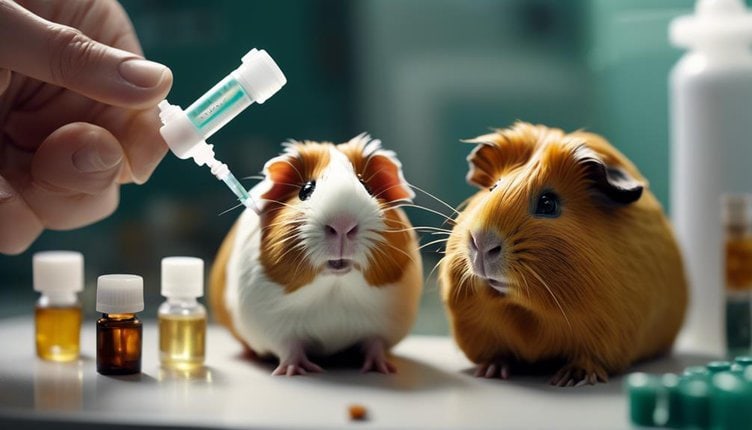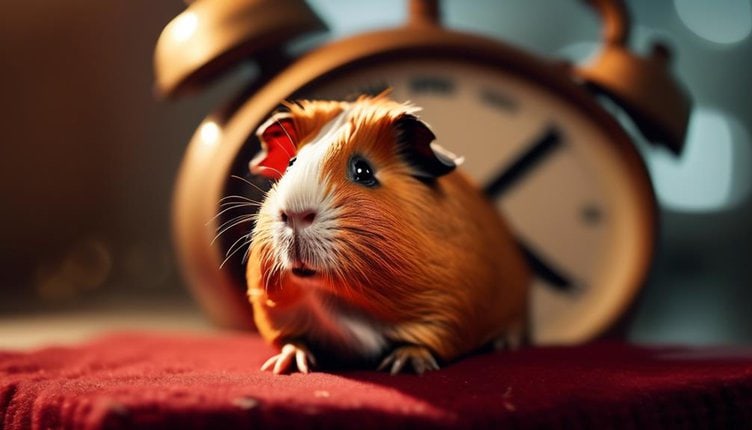Hey there, guinea pig lovers! Did you know that our adorable little pals can also suffer from conjunctivitis? Yeah, it's true! Conjunctivitis, or 'pink eye,' is no joke for our furry friends. But don't worry, I've got all the deets on the symptoms and treatment options to help you out.
When your guinea pig gets conjunctivitis, you might notice some not-so-pleasant signs. Their eyes could turn red, and they might have gooey discharge or even swelling. And let's not forget about the itchiness – it can make them pretty uncomfortable. Poor little guys!
But fear not, my friend! There are ways to ease their discomfort and bring back their bright-eyed joy. So, let's dive in and learn more about the symptoms of conjunctivitis in guinea pigs and how we can treat it.
Now that you know what to look out for, keep an eye on your furry buddy's peepers. And if you spot any of these symptoms, don't wait around – take action! There are various treatment options available, such as eye drops or ointments prescribed by your vet. They'll know exactly what to do to get your guinea pig feeling better in no time.
Remember, it's important to keep an eye on your guinea pig's eye health. By staying vigilant and seeking prompt treatment, you can help your little buddy bounce back to their happy, healthy selves. So, keep those eyes bright and beautiful, my friends!
Key Takeaways
- Conjunctivitis in guinea pigs can be caused by bacteria, viruses, allergies, and irritants.
- Good hygiene practices and minimizing exposure to infected animals can help prevent conjunctivitis.
- Common symptoms of conjunctivitis include redness, discharge, swelling, and frequent rubbing or pawing at the eyes.
- Prompt veterinary care is necessary for diagnosis and treatment to prevent complications and ensure proper care.
Overview of Conjunctivitis in Guinea Pigs
Conjunctivitis in guinea pigs, also known as pink eye, is a common ocular condition characterized by inflammation of the conjunctiva. This inflammation can be caused by various factors, including bacteria, viruses, allergies, and irritants. While it's difficult to pinpoint the exact cause of conjunctivitis in guinea pigs, certain factors can increase the risk of developing the condition.
These factors include poor hygiene, overcrowded living conditions, and exposure to other animals with conjunctivitis.
Prevention of conjunctivitis in guinea pigs is crucial to maintaining their overall health and well-being. Good hygiene practices, such as regular cleaning of cages and bedding, can help reduce the risk of bacterial and viral infections. Additionally, providing adequate space for guinea pigs to live and minimizing exposure to other animals with conjunctivitis can help prevent the spread of the condition.
It is important to note that while prevention is key, sometimes conjunctivitis in guinea pigs can't be avoided. In such cases, prompt veterinary care is necessary to diagnose and treat the condition. Treatment may include topical ointments or eye drops to reduce inflammation and combat infection. Regular check-ups and monitoring of guinea pigs' eye health can also help detect conjunctivitis early and prevent complications.
Common Symptoms of Conjunctivitis
Common symptoms of conjunctivitis in guinea pigs include:
- Redness and discharge from the eyes
- Swelling and irritation
- Watery or crusty eyes
- Frequent rubbing or pawing at the eyes
These symptoms are indicative of the inflammation and infection that occur in the conjunctiva, the thin membrane that lines the eyelids and covers the white part of the eye.
Redness and Discharge
One of the telltale signs of conjunctivitis in guinea pigs is the presence of redness and discharge in their eyes. Guinea pigs with conjunctivitis typically have reddened and inflamed conjunctiva, which is the thin membrane that covers the white part of the eye.
The redness is often accompanied by a watery or mucous-like discharge. This discharge may appear as a clear fluid or it may be thicker and more opaque. In some cases, the discharge can become crusty and cause the eyes to stick together.
When it comes to treatment options, it's important to consult a veterinarian who can accurately diagnose the condition and prescribe appropriate medication. Treatment typically involves eye drops or ointments that help reduce inflammation and alleviate the symptoms of conjunctivitis.
Swelling and Irritation
Swelling and irritation are frequently observed symptoms in guinea pigs affected by conjunctivitis. When a guinea pig has conjunctivitis, their eyes may become swollen, red, and inflamed. This can cause discomfort and distress to the animal. To address these symptoms, there are several treatment options available.
- Topical medication: Veterinarians may prescribe eye drops or ointments that contain antibiotics or anti-inflammatory drugs to reduce swelling and irritation.
- Warm compress: Applying a warm, damp cloth to the affected eye can help soothe the swelling and provide relief.
- Cleanliness: Keeping the guinea pig's environment clean and ensuring they have access to fresh, clean water can help prevent further irritation.
- Dietary adjustments: Providing a balanced diet rich in vitamin C can support the guinea pig's immune system and aid in the healing process.
- Consultation with a veterinarian: Seeking professional advice is crucial to determine the most appropriate treatment plan for the guinea pig's specific condition.
While home remedies may temporarily alleviate symptoms, it's important to consult with a veterinarian for proper diagnosis and treatment.
Causes of Conjunctivitis in Guinea Pigs

Conjunctivitis in guinea pigs can be caused by a variety of factors, including bacterial or viral infections, allergies, irritants, or foreign objects in the eye. Bacterial conjunctivitis is typically caused by bacteria such as Streptococcus or Staphylococcus, while viral conjunctivitis can be caused by viruses like the adenovirus or herpes simplex virus. These infections can be transmitted through direct contact with an infected guinea pig or through contaminated bedding or utensils.
Allergies can also lead to conjunctivitis in guinea pigs. Common allergens include dust, pollen, or certain types of bedding materials. When exposed to these allergens, guinea pigs may develop redness, swelling, and discharge in their eyes.
Irritants such as smoke, chemicals, or perfumes can also cause conjunctivitis in guinea pigs. These irritants can irritate the sensitive tissues of the eye, leading to inflammation and discomfort.
Foreign objects, such as a piece of hay or bedding, can get lodged in the eye of a guinea pig, causing irritation and conjunctivitis. It's essential to regularly check the guinea pig's environment for any potential hazards that could lead to eye injuries.
Diagnosing Conjunctivitis in Guinea Pigs
To determine the presence of conjunctivitis in guinea pigs, veterinarians employ several diagnostic methods. These methods allow them to accurately diagnose the condition and provide appropriate treatment.
Here are the key steps in diagnosing conjunctivitis in guinea pigs:
- Guinea Pig Eye Examination: The first step in diagnosing conjunctivitis is a thorough examination of the guinea pig's eyes. This includes assessing the appearance of the eyes, checking for redness, swelling, discharge, and any signs of discomfort or pain.
- Medical History: Veterinarians will also gather information about the guinea pig's medical history, including any previous eye problems or underlying health conditions that may contribute to the development of conjunctivitis.
- Laboratory Tests: In some cases, veterinarians may need to perform additional tests to confirm the diagnosis of conjunctivitis. These tests may include taking a swab or sample from the affected eye to identify any underlying bacterial or viral infections.
- Allergy Testing: Allergic conjunctivitis can occur in guinea pigs. If allergies are suspected, veterinarians may recommend allergy testing to identify the specific allergen causing the conjunctivitis.
- Other Examinations: In certain situations, veterinarians may need to perform additional examinations to rule out other potential causes of eye irritation or infection, such as foreign bodies or trauma.
Treatment Options for Conjunctivitis

Treatment options for conjunctivitis in guinea pigs typically involve a combination of topical medications and supportive care. When it comes to alternative treatments and natural remedies, it's important to consult with a veterinarian before trying anything new. While some natural remedies may provide relief, they may not fully address the underlying cause of the conjunctivitis.
In addition to traditional medications prescribed by a veterinarian, there are a few alternative treatments that can be considered. Warm chamomile tea bags can be applied to the affected eye to help reduce inflammation and soothe discomfort. However, it's crucial to ensure that the tea bags are cooled down to room temperature before application to prevent further irritation.
Another natural remedy that can be used is a saline solution. This can be made by mixing a quarter teaspoon of salt with a cup of distilled water. Saline solution can be used to gently clean the affected eye and remove any discharge. It's important to use a clean cotton ball or gauze pad for each eye to prevent cross-contamination.
While alternative treatments and natural remedies can provide temporary relief, it's crucial to seek professional veterinary care for a proper diagnosis and treatment plan. A veterinarian will be able to determine the underlying cause of the conjunctivitis and prescribe appropriate medications to address it effectively.
Preventing Conjunctivitis in Guinea Pigs
To prevent conjunctivitis in guinea pigs, maintaining a clean and hygienic living environment is essential. Guinea pigs are prone to eye infections, so taking preventive measures can help keep their eyes healthy. Here are some important practices to follow:
- Regular cage cleaning: Clean the guinea pig's cage regularly to prevent the buildup of bacteria and other contaminants that can cause eye infections.
- Proper bedding: Use clean and dust-free bedding material to reduce the risk of eye irritation and infection.
- Fresh water: Provide fresh, clean water daily to ensure proper hydration and prevent dehydration, which can make guinea pigs more susceptible to infections.
- Grooming: Regularly groom your guinea pig to keep their fur clean and free from debris that can irritate their eyes.
- Avoid overcrowding: Guinea pigs need sufficient space to move around comfortably. Overcrowding can lead to stress and the spread of infections.
When to Seek Veterinary Care

If you notice persistent or worsening symptoms of conjunctivitis in your guinea pig, it is important to seek veterinary care promptly. Conjunctivitis, also known as pink eye, can be a painful and uncomfortable condition for your pet. While mild cases may resolve on their own with proper care, more severe cases can lead to potential complications if left untreated.
To help you determine when it is necessary to seek veterinary care for your guinea pig's conjunctivitis, here is a table outlining the potential complications associated with the condition:
| Potential Complications |
|---|
| Corneal ulcers |
| Secondary bacterial infections |
| Permanent scarring |
| Vision impairment |
If you notice any of these complications or if your guinea pig's symptoms worsen or persist for more than a few days despite home care, it is important to contact your veterinarian. They will be able to evaluate the severity of the conjunctivitis and provide appropriate treatment. Remember, early intervention can help prevent further discomfort and potential long-term consequences for your furry friend.
When it comes to the health and well-being of your guinea pig, it is always better to be safe than sorry. Seeking veterinary care promptly can ensure that your pet receives the necessary treatment to alleviate their symptoms and prevent any potential complications associated with conjunctivitis.
Frequently Asked Questions
Can Guinea Pigs With Conjunctivitis Transmit the Infection to Humans?
Guinea pigs with conjunctivitis can transmit the infection to humans, although the risk is low. To minimize transmission, individuals should take precautions such as practicing good hygiene, avoiding direct contact with infected animals, and seeking prompt medical attention if symptoms develop.
Are There Any Home Remedies That Can Be Used to Treat Conjunctivitis in Guinea Pigs?
There are a few natural remedies and alternative treatments that can be used to treat conjunctivitis in guinea pigs. These options can provide relief and help improve the condition of their eyes.
Can Guinea Pigs With Conjunctivitis Still Interact With Other Guinea Pigs?
Guinea pigs with conjunctivitis should be isolated from other animals to prevent the spread of infection. Social interactions should be limited until the guinea pig has fully recovered to avoid potential transmission to other guinea pigs.
How Long Does It Typically Take for Conjunctivitis in Guinea Pigs to Resolve With Treatment?
The recovery time for conjunctivitis in guinea pigs with treatment varies, but it typically takes a few weeks for symptoms to resolve. The effectiveness of treatment depends on the severity of the infection and the promptness of intervention.
Is There a Specific Age Group of Guinea Pigs That Is More Susceptible to Developing Conjunctivitis?
Guinea pigs of all ages can be susceptible to conjunctivitis, but there is no specific age group that is more prone to developing the condition. Regular monitoring and proper care can help prevent its occurrence.





